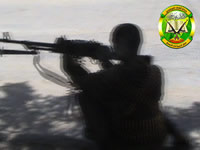 |
| Image of a Shabaab fighter from the terror group's website. |
Having consolidated its power in the Deep South along the Kenyan border, Shabaab has launched a terror offensive in the northern self-declared state of Puntland. It is a Mexican drug gang-style campaign, with an aggressive string of targeted assassinations and low profile bombings in a Somali region that had been relatively safe and prosperous.
In the last two months, Shabaab gunmen have killed two Puntland lawmakers as well as a prominent judge who was responsible for jailing some of Shabaab' s supporters; executed senior police officers; targeted an infantry division general with a roadside bomb attack; and even shot a number of clerics on the doorsteps of their mosques, accusing them of preaching moderate sermons opposed to Shabaab’s hard-line extremism.
Shabaab has also demonstrated in the past that it has the capacity to conduct a coordinated suicide bombing campaign in the North. On Oct. 29, 2008, five suicide bombers struck four compounds in the semi-autonomous regions of Somaliland and Puntland, killing 28 Somalis and wounding scores more. In that assault, three suicide car bombers struck the presidential palace, the UN Development Program compound, and the Ethiopian Consulate in the city of Hargeisa in Somaliland; and two more bombers targeted an intelligence facility in the city of Bosasso in Puntland.
Shabaab’s short-term objective is not conquering and controlling Puntland. Although the group is besieging the Transitional Federal Government in the capital Mogadishu, it is not yet capable of deploying the large number of fighters required to take over Puntland.
At this stage, Shabaab has more modest goals: asserting its presence in the North, demonstrating it can strike at its enemies even in the safest regions of the country at will, and showing it is poised to take power. It is unclear if Shabaab is conducting the current Puntland campaign using local cells or operating from more remote bases in central and southern Somalia.
In its quest to overrun Puntland, Shabaab will have to confront two strong groups. The first is Ahlu Sunna Wal Jama’a, a pro-government Somali Islamist militia that follows the religious tradition of Sufism. Shabaab has targeted Sufis for practicing a different strain of Islam, and has destroyed Sufi shrines, cemeteries, and other symbols. Ahlu Sunna Wal Jama’a is strong in the central regions of the country and has fought back against Shabaab’s incursion on its turf.
The second group standing in Shabaab’s way is the Puntland security forces. Puntland’s security services are much better organized than the poorly trained and corrupt army that backs the weak Transitional Federal Government in Mogadishu, which only controls a few small pockets in the capital.
A Shabaab victory in Puntland has dire strategic implications for the region. If Puntland becomes a failed state like the South, there will be a greatly magnified threat to the shipping passing through the Red Sea, the Bab al Mandeb waterway (the narrow strait between Somalia and Yemen), and the Gulf of Aden. In an April 2008 statement made in an al Qaeda-linked journal, al Qaeda described the Bab al Mandeb and the Gulf of Aden as "of supreme strategic importance" in their plans to control the region. With the strengthening of al Qaeda in the Arabian Peninsula in Yemen, gains by Shabaab in Puntland and Somaliland will plunge the region into crisis.
Read more: http://www.longwarjournal.org/archives/2010/01/shabaab_looks_to_the.php#ixzz0fW34hlf0

No comments:
Post a Comment